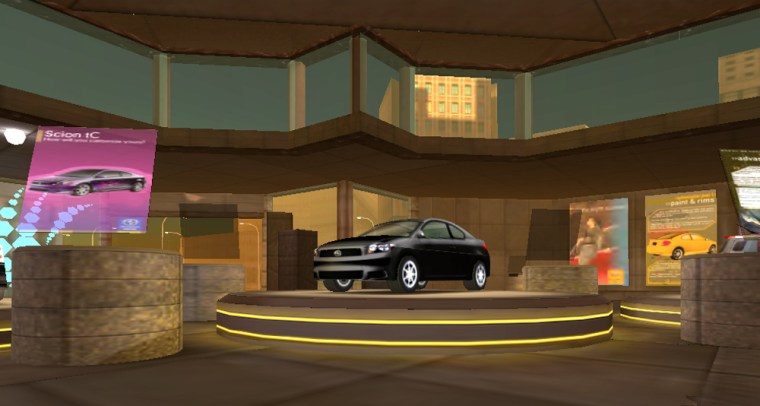For the automotive industry, it was the height of hip.
At the Chicago auto show, Toyota's Scion brand unveiled two new models in two versions — one for real life, and another for virtual shoppers in “Second Life,” the popular online universe. Visitors to “Scion City” in the virtual world could test drive the new xB and xD models and buy computer-simulated versions of the vehicles.
It was the latest effort by Toyota to keep the Scion brand relevant for its youthful target market, a task that is growing more complex as the brand gows with new models and stronger sales.
Since launching in 2004, the brand has thrived despite ho-hum reviews for its initial xA subcompact and xB wagon. Designed to appeal to American youth, sales of the quirky cars, boosted by the popular tC sport coupe, have jumped from 99,259 units in 2004 to 173,034 units in 2006, according to forecasting and consulting firm Global Insight.
Now Scion is back with the two new models, hoping to impress the Generation Y target customer base — a famously fickle generation of about 75 million people loosely defined as those born between 1978 and 1994.
“This generation is huge, and if you miss the boat with them, or alienate them entirely, you’ll have a hard time winning them back,” said auto industry analyst Rebecca Lindland. “There are 75 million of them and they’re going to be a huge part of the buying market in the next 5 to 10 years.”
Toyota markets the Scion brand differently from the regular Toyota brand or luxury Lexus line, said Lindland. Scion tries to keep its models fresh and focuses on “underground” marketing tactics like the Second Life launch. Scion rarely advertises on television, she noted.
“They really are trying a totally different type of marketing that will appeal to Generation Y — a group of people that really hasn’t adopted a brand yet,” Lindland said. “Scion has a really good grasp of the power that the Internet provides — it really is this generation’s mode of communication. They really haven’t known life without it.”
For Scion, it’s all about how to move forward. The company can continue with its underground marketing and edgy, “hip-hop” style, or it can become more mainstream and try to broaden its appeal, Lindland said. But there’s danger in that sort of move, she said.
The tC has sold well mainly by appealing to an older market of baby boomers looking for a sporty weekend runabout.
“Scion’s all about being on the cutting edge, but the problem is you can try to hard,” she said. “The difficult here is weeding out the baby boomers so they are not your target demographic. Baby boomers are all about reliving their youth, and Scion could represent that.”
Scion’s approach to marketing Scion has parallels to its efforts with the Tundra full-size pickup. In marketing the new, larger version of the truck, Toyota is not just selling a vehicle but also about trying to give the brand a broader appeal, especially in the U.S. heartland where the company traditionally has not performed as well.
To boost its appeal, Toyota built its Tundra factory in Texas, the leading state for truck sales, and has become the first foreign manufacturer since the 1950s to supply cars for NASCAR’s top series, the Nextel Cup, entering a version of the best-selling Camry.
Generation Y is not likely to respond to the same sort of marketing, according to Global Insight research, which has found that these younger buyers seek out luxury and are not prepared to wait for it. Gen Y consumers idolize luxury brands like BMW, said Lindland.
“But even though this is a tough demographic, I don’t think they will see them fail,” she said. “They have the best and brightest at Toyota working on the Scion brand. These people are very hip and smart, and Toyota itself is terrified of failure, so this brand has a lot of investment thrown at it. … It’s very coddled.”
